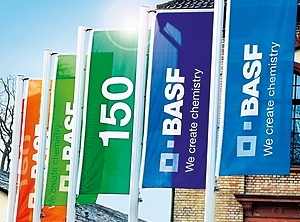BASF
Expansions planned for plastic additives / More capacity for HALS
 The German company said it will increase additive output at two sites (Photo: BASF) |
Germany’s BASF (Ludwigshafen; www.basf.com) plans to increase output of its hindered amine light stabilisers (HALS) at sites in Pontecchio Marconi, Italy, and Lampertheim, Germany, as part of a multi-stage investment to support the growing demand for light stabilisers used in durable plastics applications. It did not provide financial details or a timetable for when the capacity will be onstream.
The German group, which claims to be the only supplier of plastic additives with production sites on four continents, said it has continuously updated and expanded capacity. Both the Italian and the German sites are world-scale, strategic production locations for the HALS and NOR HALS products, it said.
Related: Launch of RegXcellence service for plastic additives customers
Achim Sties, Senior VP, Performance Chemicals Europe, said BASF is seeing growing demand in particular for durable and sustainable plastic materials used in automotive, construction, and greenhouse applications, and the investment in production infrastructure will help increase the resilience and efficiency of operations.
Plastic additives contribute to sustainability by boosting durability and avoid waste in specific applications, BASF noted, adding that its HALS additives Tinuvin, Chimassorb, and Uvinul protect polymers from UV radiation and are effective inhibitors of free-radical induced degradation.
The German group, which claims to be the only supplier of plastic additives with production sites on four continents, said it has continuously updated and expanded capacity. Both the Italian and the German sites are world-scale, strategic production locations for the HALS and NOR HALS products, it said.
Related: Launch of RegXcellence service for plastic additives customers
Achim Sties, Senior VP, Performance Chemicals Europe, said BASF is seeing growing demand in particular for durable and sustainable plastic materials used in automotive, construction, and greenhouse applications, and the investment in production infrastructure will help increase the resilience and efficiency of operations.
Plastic additives contribute to sustainability by boosting durability and avoid waste in specific applications, BASF noted, adding that its HALS additives Tinuvin, Chimassorb, and Uvinul protect polymers from UV radiation and are effective inhibitors of free-radical induced degradation.
17.03.2022 Plasteurope.com [249890-0]
Published on 17.03.2022
